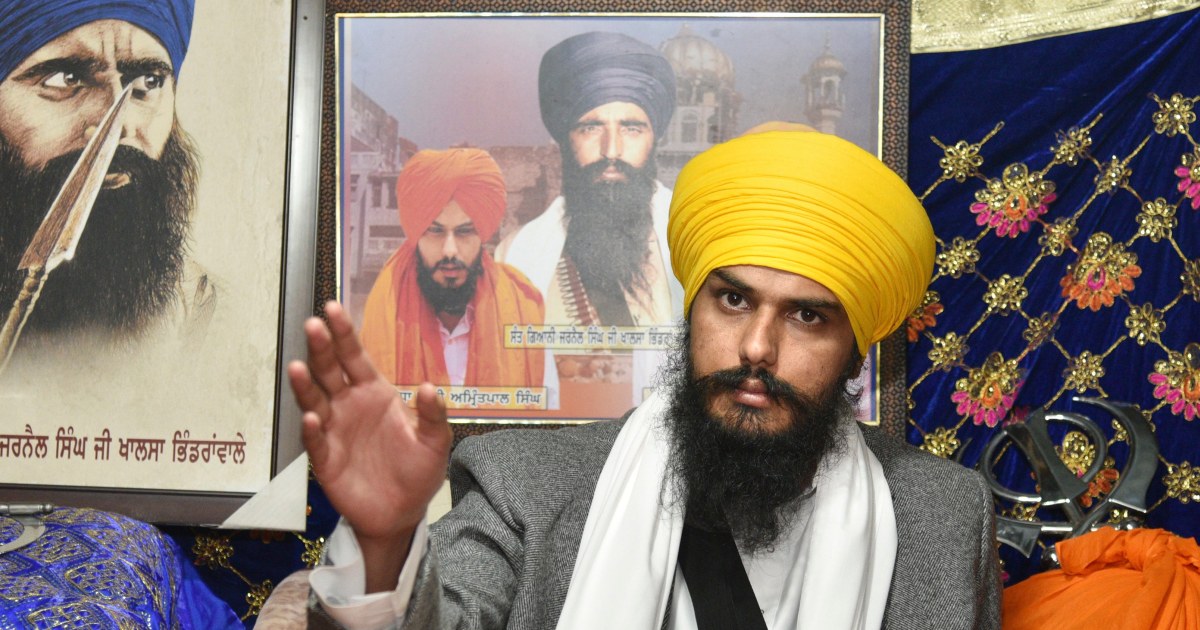NEW DELHI (AP) — Indian police on Sunday arrested a separatist leader who revived calls for an independent Sikh homeland and secession from the northern Indian state of Punjab, which has a history of violent insurgency.
Amritpal Singh had been on the run since last month after capturing national attention in February when hundreds of his supporters stormed a police station in Ajnala, a city in the state of Punjab, with wooden batons, swords and guns to demand the release of an imprisoned assistant. .
Punjab state police said on Twitter on Sunday that Singh was arrested in Moga, a city in the state.
A Sikh religious leader, Jasbir Singh Rodde, said Singh surrendered after offering morning prayers at a Sikh shrine in Moga.
Police officer Sukhchain Singh Gill said police had surrounded the village with intelligence that Singh was at the shrine. “The unrelenting pressure exerted by the police over the past 35 days has left Singh with no other choice,” Gill told reporters.
He said that the police did not enter the sanctuary, implying that Singh was detained after he left. Gill declined to confirm if Singh surrendered as his supporters claim. Singh was airlifted to Dibrugarh, in north-east India, where he will be detained until he is brought before a court to face charges.
Punjab suffered a bloody insurgency in the 1980s that led to the assassination of then India’s Prime Minister Indira Gandhi by her Sikh bodyguards at her official residence in New Delhi. Her assassination in 1984 sparked bloody riots by her Hindu supporters against Sikhs in northern India.
Ashwini Dubey, a lawyer in Punjab state, said Singh’s arrest would help police dismantle the separatist network and its supporters.
Tavleen Singh, a political commentator and former journalist who covered the Punjab insurgency in the 1980s, said: «The police took this man out, which is a good thing because if they had gone into a gurdwara (Sikh shrine) and started shooting , they would have had a reaction from the general population. Sikhs turn out to be very sensitive to gurdwara attacks.»
Sikhs are a religious minority in India and say they are discriminated against by the Hindu majority. More than 3,000 people were killed by extremists during the 1980s insurgency in the prosperous agricultural state. The insurgency was crushed by Indian forces in 1990.
Punjab borders Kashmir controlled by India and Pakistan. India accuses Pakistan of supporting, training and arming the insurgents, a charge Islamabad denies.
Police have declared Singh, a 30-year-old preacher, a fugitive, accusing him and his aides of stirring up trouble in the state. The police accused them of sowing discord among the people, attempted murder, attacking police personnel, and obstructing the legal performance of their duties by public servants.
The authorities deployed thousands of paramilitary soldiers in the state and arrested nearly 100 of their supporters. Singh’s wife was prevented from leaving India last week.
Very little was known about Singh until he arrived in Punjab state in 2022 and began leading marches calling for the protection of the rights of Sikhs, who make up about 1.7% of India’s population.
Singh claims to be inspired by Jarnail Singh Bhindranwale, a Sikh militant leader accused by the Indian government of leading an armed insurgency in the 1980s. Bhindranwale and his supporters were killed in 1984 when the Indian army stormed the Golden Temple, the holiest shrine of the Sikh religion.
Singh has styled himself as Bhindranwale, with a long flowing beard. He also dresses as Bhindranwale.
Singh also heads Waris Punjab De, or Heirs of Punjab, an organization that was part of a massive campaign to mobilize farmers against controversial agricultural reforms pushed through by Prime Minister Narendra Modi’s government. The legislation sparked a year of protests that began in 2020, when farmers, most of them Sikhs from Punjab state, camped out on the outskirts of New Delhi during a harsh winter and a devastating wave of coronavirus. The protests ended after the Modi government withdrew the legislation in November 2021.

